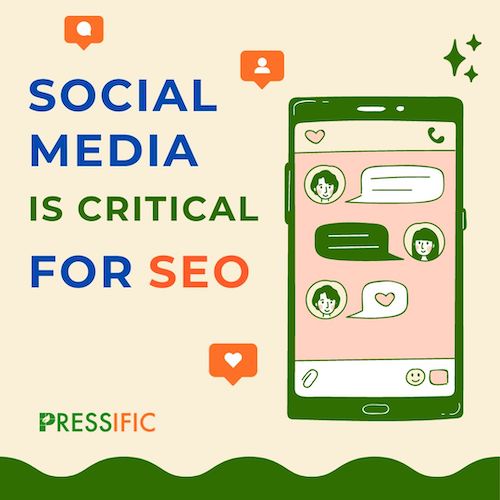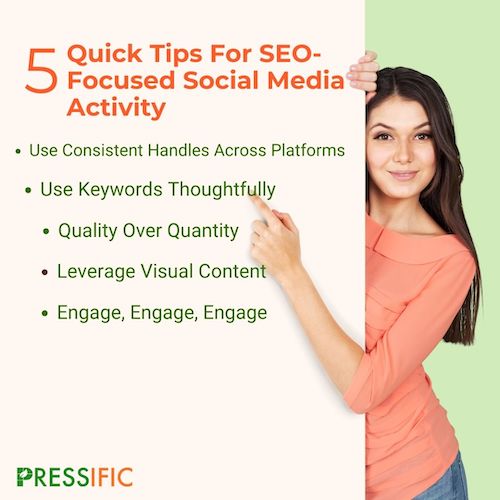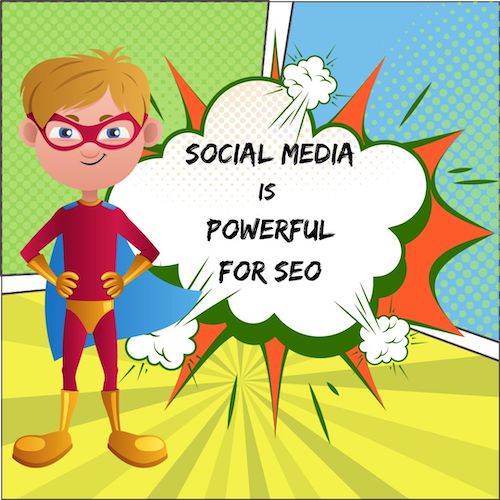Introduction
When it comes to Search Engine Optimization (SEO), we often get caught up in keywords, meta descriptions, and backlinks. But there’s another player in the game that can no longer be ignored—Social Media. By having a strong social media presence, you’re sending signals to search engines about your website’s popularity and relevance.
In the crowded online marketing space, it’s vital to know what the role of social media is for your website. With everyone trying to get attention, social platforms can help your business’s voice stand out. Using social platforms smartly can boost your online presence and get you noticed more easily not just by potential customers but also by Search Engines such as Google, Bing and to a lesser extent ChatGPT and Yahoo.
Let’s dive into how your social media activity can actually give you the SEO edge you’ve been looking for.

The Symbiotic Relationship Between Social Media and SEO
How Social Media Boosts Your SEO Game
Picture social media as the buzzing café corner of the online world. It’s where stories are shared, ideas are born, and lively chatter never stops. Beyond the buzz, though, lies a superpower: its ability to boost your website’s search engine ranking.
You might be thinking, “Aren’t social media and SEO two separate things?”
While they might seem like apples and oranges, together they create a delicious digital fruit salad that nourishes your online visibility.
Consider your SM accounts as the front-line champions of your brand in the vast online arena. Every like, share, or comment on your posts is like a virtual thumbs-up, telling search engines, “Hey, this content is valuable!”
Picture this: a well-framed tweet about your latest blog post gets tons of likes and shares. This isn’t just social media love; it’s a bright beacon to search engines about the quality of your content.
Or when a post of yours goes viral – it’s not just getting your message out, but also signaling to search engines about your brand’s relevance.
It’s not just getting your message out, but also signaling to search engines about your brand’s relevance.
Such online engagements don’t just boost your online rep; they direct people right to your website, driving essential traffic for better SEO results.
If your social media isn’t yet playing ball with your SEO game, now’s the time to pair them up. Ready to explore how? Let’s dive deeper.
Choosing the Ideal Social-Media Platform for Your SEO Strategy
Facebook: The Shareable Content King
Google’s crawlers take note when your content is widely shared, liked, or commented on on Facebook. Each interaction counts as a ‘vote’ for the credibility and relevance of your site.
Instagram: Visuals That Speak
High-quality visuals that go viral can encourage people to seek out your website, contributing to your site’s SEO by increasing traffic and lowering bounce rates.
LinkedIn: Where Professionals Meet

Publishing authoritative content on LinkedIn not only establishes you as a thought leader but can also drive high-quality traffic to your website. And Google loves quality traffic.
Pinterest: A Visual Search Engine
Though often overlooked, Pinterest acts like a visual search engine. Pins linking back to your website can drive targeted traffic, improving your site’s SEO. When your pins get saved and shared, it’s a signal to search engines that your content is valuable.
Reddit: The Community Hub
Reddit is a goldmine for niche audiences. By engaging in relevant subreddits and offering valuable insights, you can drive interested traffic to your site. Though the links are no-follow, the high engagement rates can indirectly boost your SEO.
Amplifying SEO with Diverse Social Platforms
The realm of social-media is vast, offering a plethora of platforms, each with its distinct features and audiences. While Facebook, Instagram, and Pinterest might be the giants, there are several other social media platforms that brands can leverage for enhanced SEO benefits. Engaging users, building brand authority, and driving traffic back to your website are all achievable across different social channels.
Let’s delve into some platforms beyond the usual suspects and explore how they can bolster your SEO efforts.
- Twitter:
- Overview: Known for its real-time updates and concise posts, Twitter is a platform where news breaks and trends start.
- SEO Benefit: While tweets themselves may not boost your site’s search rankings directly, the platform is excellent for content distribution, which can lead to more shares and increased website traffic.
- Example: A well-timed tweet about a trending topic relevant to your brand can lead to numerous retweets and click-throughs to your site.
- YouTube:
- Overview: As the second-largest search engine after Google, YouTube is the go-to platform for video content.
- SEO Benefit: Videos can rank organically in both Google and YouTube’s search. Properly optimized video content (using descriptions, tags, and transcriptions) can significantly increase your visibility.
- Example: A tutorial video on a popular topic with a well-optimized title and description can attract thousands of viewers, some of whom might proceed to your website for more information.
- TikTok:
- Overview: A platform for short-form video content that has gained immense popularity, especially among younger audiences.
- SEO Benefit: While it’s newer to the scene, TikTok can drive significant traffic to your site if your content goes viral.
- Example: A fun, engaging 30-second video showcasing a product or service can lead viewers to seek out your brand’s website or other social profiles for more details.
- Quora:
- Overview: A Q&A platform where users ask questions and get answers from both experts and community members.
- SEO Benefit: By answering questions relevant to your industry, you can establish authority, direct users to your website, and potentially increase organic search traffic.
- Example: A detailed answer to a commonly asked question in your field, with a link to a related article on your site, can bring curious readers directly to your doorstep.
- SlideShare (now part of LinkedIn):
- Overview: A platform for sharing presentations, infographics, and documents.
- SEO Benefit: Well-optimized content on SlideShare can rank on its own in search results. Moreover, you can embed links in your presentations directing viewers to your site.
- Example: A comprehensive slideshow about a trending industry topic, embedded with links to related articles or resources on your website, can be a traffic driver.
Remember, the key to leveraging social platforms for SEO is not just being present on the platforms but also creating quality, relevant content that encourages users to engage, share, and ultimately visit your website.
Quick Tips For SEO-Focused Social Media Activity

- Use Consistent Handles Across Platforms: Consistency makes you easily searchable both on social media and search engines.
- Use Keywords Thoughtfully: Incorporate relevant keywords in your social media posts, without making them look forced.
- Quality Over Quantity: Search engines favour quality interactions over the number of followers.
- Leverage Visual Content: High-quality images and videos not only make your social media posts more engaging but also contribute to better SEO rankings when properly tagged and described.
- Engage, Engage, Engage…: Active engagement with your audience not only boosts your social metrics but also positively impacts SEO.
The Impact: From Social Media Metrics to SEO Analytics
When done right, social-media can significantly boost your SEO metrics, from increased site visits to lower bounce rates and longer session durations. You’ll not only dominate social media but the search engine results pages (SERPs) as well.
Conclusion

Social Media isn’t just about building brand awareness or customer engagement anymore. It’s a powerful tool that, if used effectively, can contribute significantly to your SEO efforts. So, next time you tweet or post an update, remember that you’re also boosting your chances of SEO dominance.
Ready to dominate SEO through social platforms? Go ahead and give these tips a try. You’ve got this!
FAQ
Is social media required for SEO?
Absolutely, social media plays a key role in SEO. When you share content on social media platforms, it increases your online visibility, drives traffic, and fosters engagement—all factors that search engines consider good indicators of a site’s quality. While social media isn’t the be-all and end-all of SEO, it definitely helps in boosting your website’s ranking. So, getting your social game strong can give you an edge in the SEO landscape.
Other Articles to Help Boost Your SEO
SEO Guide For Absolute Beginners – No Jargon, No BS
The Ultimate 12-Month SEO Strategy: Your Step-by-Step Guide
Maximize Your SEO Potential with Pressific’s Expertise
12 Questions You Must Ask Your SEO Specialist – And How Pressific Has Got You Covered






